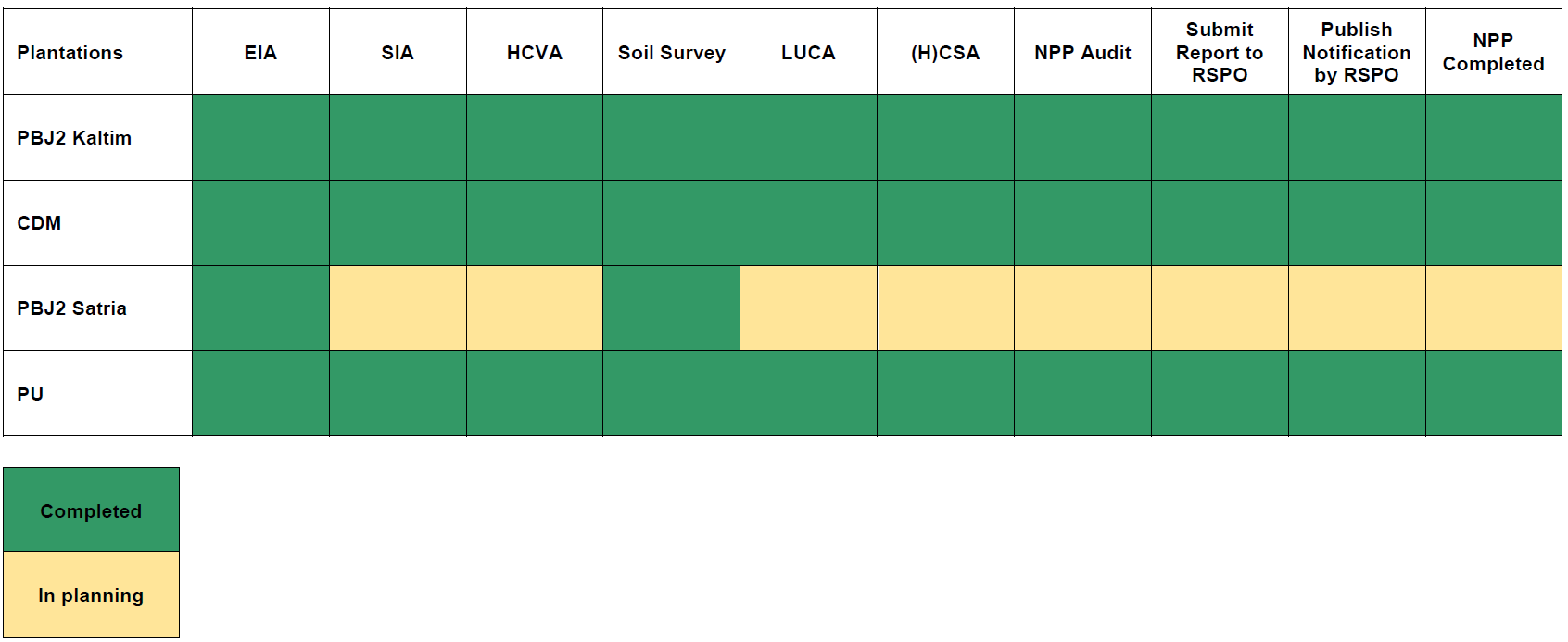RESPONSIBLE DEVELOPMENT
To mitigate the environmental and social impacts associated with oil palm expansion, the group has in place a policy and standard operating procedure for responsible development.
A critical stage of developing a new oil palm plantation is the land acquisition process. REA takes care to ensure that all legal, formal, customary or traditional land use rights linked to an area of land are systematically identified, verified and documented. Only if free, prior and informed consent (FPIC) is granted by any land use rights holders will the land acquisition and development process proceed.
The company undertakes a rigorous process to determine legal ownership of the land for which compensation is payable. This process consists of the following steps:
- Individual discussions and land identification by, amongst others, participatory mapping with the individuals who identify themselves as being the rightful landowners and with the involvement of local government officials
- Discussions and compensation negotiations with the verified landowner
- If agreement is reached over the level of compensation to be paid by the company to the verified landowner, payment documentation is drafted for ratification by the village and sub-district government. If agreement is not reached about the level of compensation, the land will be excluded from the development plan until such time as an agreement is reached
- Compensation payments are made to the landowner
- Documents confirming payment are ratified the relevant parties.
The group’s Responsible Development policy (updated in September 2021) frames the company’s commitment to recognising indigenous and local communities’ rights based on the UN Declaration on the Rights of Indigenous Peoples (UNDRIP) and the ILO Indigenous and Tribal Peoples Convention (no. 169). This policy applies to all land developed by REA that will be owned either by REA or by its associated smallholder cooperatives and independent smallholders. REA ensures that any third party contractors involved in the development of land also adhere to this policy.
Once an area of land has been acquired, REA endeavours to use it wisely, minimising the environmental impact of its operations by implementing international standards of best practice. This means limiting oil palm cultivation to land that is agriculturally suitable and avoiding the development of primary forests and peat soils, which are high carbon stock areas, and HCV areas. Detailed land use plans for each concession are prepared based on the results of field surveys conducted prior to land clearing, as embodied in the RSPO’s new planting procedure, upon which the group’s policy is based. This includes an Environmental Impact Assessment (EIA), soil survey, HCV assessment conducted by RSPO-approved consultants, carbon stock assessment and, if necessary, a hydrological assessment. Whilst undertaking these surveys can significantly delay the commencement of land clearing, such detailed due diligence is critical to the group’s ability to develop sustainable palm oil operations.
The group conducts biannual social impact assessments in the communities surrounding the estates, focused on the perceptions of the households as to how the group’s activities have affected their daily lives.
Progress of the RSPO’s NPP for new development areas 2022

EIA: Environmental Impact Assessment
SIA: Social Impact Assessment
HCVA: High Conservation Value Assessment
LUCA: Land Use Change Analysis
(H)CSA: (High) Carbon Stock Assessment
NPP: New Planting Procedure
RSPO: Roundtable on Sustainable Palm Oil
PBJ2 Satria
- The NPP audit for PBJ2 Satria was conducted in 2016 with Certification Body BSI and the report was submitted to the RSPO in 2017. After review by the RSPO, they indicated that it was necessary to update and review the HCV, CSA and LUCA assessments, as these were out of date at the time of NPP submission
- There is an overlap with a mining concession in the PBJ2 Satria concession and, therefore, the NPP process is temporarily on hold pending a resolution of the overlap
- With the updates to the RSPO Principles and Criteria in 2018 and RSPO New Planting Procedure in 2021, the new NPP regulations require updating the integrated HCV-HCSA assessment by the ALS assessor in addition to updating the previous LUCA, SIA and GHG assessments
- ALS HCV-HCS assessments and updating the LUCA, SIA, and GHG assessments were carried out by a third-party consultant, Sonokeling Accredited Nusantara (SAN), in February 2023. However, the assessment could not be completed as Gunung Sari Village, represented by the Village Head, refused to grant access to SAN since most of the land in Gunung Sari village has already been compensated by mining companies. The legal department is currently negotiating a solution with the Village Administration to resolve this issue
PU
- First assessments of HCV, LUCA, CSA were conducted in 2014 and updated in 2018
- PU obtained a satisfactory HCV assessment in February 2021 and the HCSA standalone report for PU was approved in June 2022 by the HCSA Steering Committee
- Submission of verified NPP documentation was made to RSPO by the Certification Body in June 2022. After the review process by RSPO, approval was given on 12 October 2022